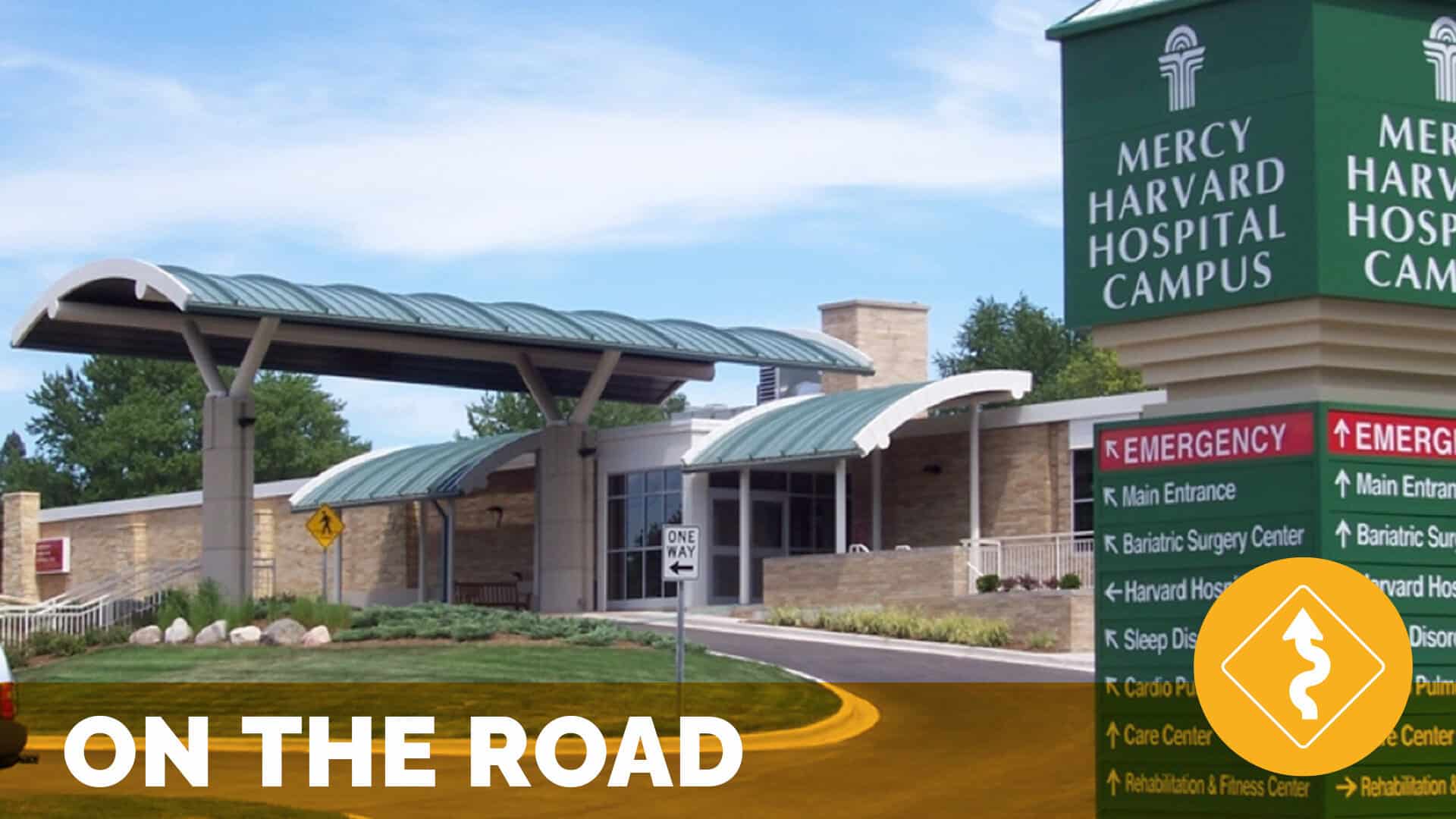A Culture of Community as a Foundation for Patient Experience at a Rural Hospital

On the Road with Mercyhealth Hospital and Medical Center–Harvard – July 2018
by Stacy Palmer, CPXP
Our latest On the Road took us to the rural city of Harvard, Illinois, approximately seven miles south of the Illinois/Wisconsin border. With a population of 10,000, Harvard is home to Mercyhealth Hospital and Medical Center–Harvard, a dynamic and comprehensive healthcare campus serving the region. This 13-bed critical access hospital has built a culture of service that is felt as soon as you walk through the front door and radiates throughout the organization.
My gracious hosts for the visit were Theresa Hollinger, Director of Nursing and Bryan Visser, Manager of Patient Experience. As the co-leaders of Harvard’s patient experience journey, they started by sharing MercyHealth’s ‘Critical Moments of Service,’ standards of excellence in customer service that have shaped Harvard’s culture and helped to define behavior standards throughout the organization. The Critical Moments of Service include detailed expectations in five key areas of patient care:
- Respect. We are committed to being respectful, kind and compassionate to our patients, their families, other visitors and our partners.
- Communication. We listen carefully and respond with sensitivity to the preferences of our patients, their families and visitors to enhance mutual understanding, reduce anxiety and provide the very best patient experience.
- Professionalism. We demonstrate professionalism in our behavior, appearance and interactions.
- Privacy and Confidentiality. We ensure privacy and confidentiality in all interactions and in all settings.
- Safe and Caring Environment. We provide a healing, healthy and safe environment for our patients, families, visitors and partners.
Coupled with Mercyhealth’s service excellence standards, the Critical Moments of Service reinforce the organization’s commitment to providing medical excellence and human compassion. “These standards, along with department-specific expectations, help create a warm and caring environment for our patients, partners and visitors. Our passion for making lives better shows up in these critical moments—in each smile, in each compassionate touch, in each act of kindness,” said Javon R. Bea, President/CEO, Mercyhealth. “Nothing is ever too small or taken for granted. Everything matters, every little thing.”
Staff Members are Partners
A great example of the Mercyhealth experience approach is the fact that they refer to staff at all levels and in all roles as partners. As partners, everyone is empowered to make choices to ensure they can deliver the best possible care and experiences.
Hollinger shared an example of that empowerment through the department-specific white boards that were designed by nurses who viewed sample boards online and then chose the pieces and format that worked best for their individual needs and team. “It can be a challenge, at times, to step back and let our partners govern, but the process and lessons learned create a great sense of pride and ownership.”
Mercyhealth shows a great commitment to advancement of partners. They recently developed a detailed clinical ladder to help nurses understand ways to best position themselves for advancement opportunities. The program includes peer evaluations specifically focused on patient stories where partners share how specific situations impacted their minds, hearts and hands.
Continuous learning and education is one of MercyHealth’s Guiding Principles for Patient Experience, a set of commitments Visser helped create when he stepped into his role. “Patient perceptions are constantly changing. In order to effectively manage that change employees need to be working to refine current skills and to develop entirely new skills-sets that will enhance the patient experience,” he said. “This refinement and these skill-sets can only be established and hard-wired through consistent education and evaluation. Education is grounded in communicating high expectations, providing prompt feedback, respecting and accessing the diverse talents of employees while engaging partners in continuous and active learning.”
Harvard also supports student nurses through an extensive internship program. “An internship with a critical access hospital offers students exposure to many more situations and hands-on learning opportunities than a typical hospital,” said Hollinger sharing that many of their student interns come back in full time roles after graduation.
Supporting the Local Community
Partners also drive Harvard’s community involvement programs by identifying opportunities and pulling together efforts such as food drives, coat drives and holiday giving trees. “Harvard has a very generous team. We’re like a family,” said Visser sharing examples such as times when partners went to patients’ homes to check on them and even recalling a time when a Medical Nurse gave her own coat to a patient who needed one.
I was also touched to learn that partners in Harvard’s Care Center, an affiliated organization on campus for long term care residents and rehab patients, started a program to personally purchase holiday gifts for residents. “This is what Mercyhealth is about,” said Tracy Bernardo, Manager of Harvard Care Center.
Driving a Culture of Excellence
The culture and spirit of Harvard were apparent in all areas I walked through, causing me to want to better understand what the team attributed their success to, as we know building a culture of excellence is a foundational element of a successful patient experience effort and I was eager to share Harvard’s formula for success with others.
Mercyhealth offers a number of perks to keep partners happy and healthy, such as reimbursements for fitness memberships, weight loss programs and smoking cessation. They have implemented several programs to help partners cross-train and progress in their careers, but the primary reasons the partners I talked with cited for why they stay at the hospital (the average tenure is 11 years) were atmosphere, relationships (with partners AND patients) and autonomy.
Harvard’s human resource leader, Meagan Romer, summed it up the significance of Harvard’s culture well sharing a simple philosophy, “Happy employees give a happy patient experience.”
Visser shared MercyHealth’s commitment to team building as a foundation for patient experience as they realize while most people working in healthcare started their career with the intent to help people and make a difference in the lives of patients, healthcare is a tough business and often this desire wanes over time as partners experience the complex nature of the industry. “We support and recognize our partners as caregivers who at times may be in need of care and support themselves. We want to engage partners and reenergize them to go above and beyond in creating a powerful patient experience,” he said offering the following priorities illustrating ways partner engagement is supported through experience efforts:
- Provide partners with value-added and actionable patient experience data.
- Engage partners as stakeholders and solicit their feedback in patient experience initiatives.
- Celebrate the successes of partners when they do great work.
- Inspire partners to stay focused through the telling of meaningful stories.
- Connecting with Patients
Several partners acknowledged that the slower pace of a rural hospital (the emergency department averages 17 visits per day) allows them to focus more on patient relationships. They take advantage of opportunities to interact with patients and families and make people feel comfortable overall. “Our partners care deeply about our patients,” said Connie Bradbury, Staffing Coordinator, as she shared the story of a housekeeping partner named Robin who noticed a patient who had not previously been mobile walking down the hall. “She was so proud of him and wanted to ensure he knew that she saw him. They were both smiling and waving.”
Bradbury also shared a great story of patient connections that reinforces the importance of listening to patient/resident input. A few years ago, there was a tornado warning in the Harvard area that required the Care Center to take measures to move patients and residents to a safe place. She shared that they did everything they thought they needed to do to keep patients and residents safe and comfortable. Luckily, no damage happened from the storm and they were able to move everyone back to their rooms. But they received some interesting feedback from one of their residents who pointed out the one step they missed. They did not clearly explain to the residents what was going on and why. They were so focused on doing what they needed to do for safety that they neglected to explain it, causing additional anxiety. The team took this to heart and actually enlisted that resident on their Patient Experience Committee. She helped guide the organization in a new process to periodically communicate with patients and residents on overall emergency procedures. I appreciated the transparency about the situation and the opportunities identified and implemented for improvement. The story also serves as a great reminder to partners in other areas to seek and consider patient feedback and perceptions in all they do.
I was impressed by Harvard’s approach to patient experience, their commitment to culture and community and their acknowledgements of what is necessary to continue to provide the best for the patients, families and partners who encounter their organization. A significant challenge for any critical access hospital is the need to be ready for any patient situation that comes through the door as these organizations are in rural areas, typically without access to other hospitals or medical care within 35 miles or more. “Our physicians and partners must be competent in all areas and able to handle any patient need that comes in,” said Hollinger explaining Harvard’s extensive training and the unique nature of having so many different expertise and departments under one small roof.
“A small hospital does not mean decreased quality. Our entire staff is second to none. Everyone here is committed to providing the best service, the best quality of health care, the best experience to all our patients,” says Shailesh Virani, MD, board certified family medicine physician at Mercyhealth Harvard South, and president of Mercyhealth Hospital and Medical Center–Harvard medical staff.
Related content
-
 Patient Family & Community Engagement | Policy & Measurement | Staff & Provider Engagement
Patient Family & Community Engagement | Policy & Measurement | Staff & Provider EngagementSignals to Action: Northwestern Medicine’s Journey to Humanizing Healthcare Experiences
In an effort to (re)build trust post-pandemic, many health systems are experiencing the pressure to modernize methods used to engage patients and the workforce who care for them. This trend towards an improvement-focused understanding is reflected in the greater conversations happening across our industry, including the evolved shift in understanding from “Patient” to “Consumer” and
Learn more -
 Patient Family & Community Engagement | Staff & Provider Engagement
Patient Family & Community Engagement | Staff & Provider EngagementThe Importance of Emotional Intelligence in Patient Relations (Part 2)
The Patient Relations department assesses and resolves complex patient issues related to customer service, billing, and patient care daily by researching errors and patient issues and finding the proper solution to satisfy the needs of the patient and their care partners. Individuals possessing a high emotional intelligence (EI) quotient can use their emotions as a
Learn more -
 Staff & Provider Engagement
Staff & Provider EngagementHealthcare Team Members’ Views on Social Determinants of Health Screening and Referral Practices in a Pediatric Emergency Department
We aimed to explore the healthcare team members’ (HTMs) views on social determinants of health (SDH) screening and referral processes in a pediatric emergency department (PED). We conducted a cross-sectional, mixed-methods study to explore PED HTMs’ views on social care practices at a quaternary-level children’s hospital. The survey was created using a goal identification framework.
Learn more
